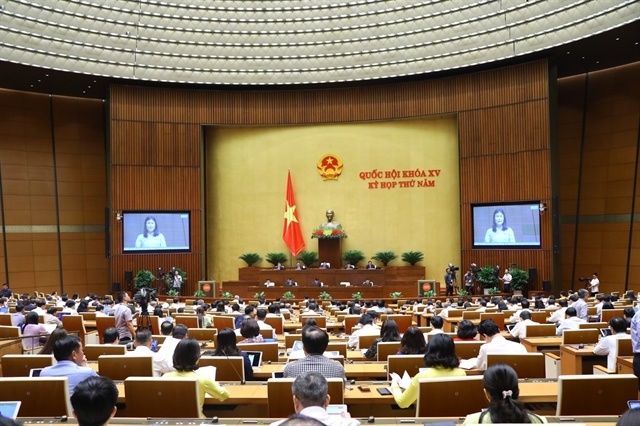 Politics & Law
Politics & Law


|
| An overview of the discussion session on Thursday morning. — VNA/VNS Photo Văn Điệp |
HÀ NỘI — During discussions about socio-economic development yesterday morning, National Assembly (NA) deputies agreed that the State and the society should closely support the enterprise community.
Deputy Phạm Trọng Nghĩa, from Lạng Sơn Province, said that on a global scale, the socio-economic situation this year was not bright. Wars and strategic competition are fierce, inflation is high while global trade slows down and all socio-economic indicators are lower than last year.
The International Monetary Fund (IMF) forecasts that global economic growth this year will reach only 2.8 per cent and about three per cent in the next five years. This is the lowest level in more than 20 years.
Besides economic difficulties, job losses are and will happen rapidly in the world. The International Labour Organisation (ILO) said that job growth this year is only one per cent and forecasted only 1.1 per cent next year.
Considering that enterprises are the economy’s soul, the business community has made many contributions to the country's development, especially during the COVID-19 pandemic, Nghĩa said, adding that more policies are needed to support the business community during this difficult period.
Nghĩa suggested the NA and the Government reduce taxes, fees and other financial obligations for businesses and the people.
He agreed to reduce value-added tax (VAT) by two per cent and extend it to next year and recommended the Government promote tourism development, reform administrative procedures, create maximum convenience for businesses and have a plan in place to solve social security problems that arise.
"The global economy difficulty is a test for the domestic economy’s resilience, and also an opportunity to adjust policies to attract investment, identify export strengths and develop the domestic market. This is also the time to reduce extra working hours for workers", said Nghĩa.
He added that last year, the average labour productivity growth rate reached only 4.8 per cent. This is the second year in a row the rate did not meet the NA’s target.
The economic restructuring plan for the 2021-25 period clearly stated that the average labour productivity growth rate is over 6.5 per cent per year.
Nghĩa recommended the Government evaluate more specifically the cause and then have specific solutions to achieve the target for this year and the following years.
Human resources quality is a decisive factor for labour productivity. Therefore, Nghĩa proposed to urgently issue three strategies to develop human resources, education and intellectual for the period 2021-30.
Deputy Nguyễn Hoàng Bảo Trân, from Bình Dương Province, said that textile, garment and wood had strength for export but were struggling with many difficulties and challenges.
Besides, authorities’ statistics showed that 2.7 million workers across the country are owed social insurance for one month or more. Of whom, more than 200,000 have their benefits suspended after enterprises went bankrupt. Recently, the number of unemployed workers has increased rapidly due to orders shortage.
Another difficulty mentioned by Trân is that the vehicle registration procedure was becoming a burden for businesses and people, especially logistics businesses. They almost broke their supply chain when their vehicles are not eligible for work. This makes vehicle registration no longer a technical problem but becomes an additional expense for businesses and people when the registration takes so much time.
Trân proposed the Government, the Ministry of Labour, Invalids and Social Affairs and the Việt Nam Social Security deal with enterprises evading social insurance, and ensure the legitimate interests of employees.
She suggested authorising car companies and garages to have enough technical conditions to carry out the registration work. The Government should have random post-inspection of these facilities to make sure of technical safety standards.
Education
Also in the discussion, the deputies suggested making a plan for the higher education system which is closely linked with the national socio-economic development strategy and regional and local development orientations.
Deputy Bùi Thị Quỳnh Thơ, from Hà Tĩnh Province, said that higher education autonomy helped universities be more proactive in deciding professional, financial, and human resource issues. But, it faces challenges in calling for financial resources.
A survey at a number of universities, she said, showed that the autonomy mechanism made competition among universities fiercer and fiercer.
Universities will organise training courses that are easy to enrol students, making an imbalance in the national human resource development strategy.
Teaching and learning quality, especially in training masters, is no longer a top concern. Instead, it is the sources of income and the number of students that can be recruited.
The Law on Higher Education is not consistent with other specialised laws in regulating higher education activities. Many universities met difficulties related to human resource management and finance.
Thơ proposed to clearly assign specific tasks and core missions for universities based on local development strategies, and do not attach great importance to financial autonomy.
Universities should re-evaluate their current training effectiveness and improve training programmes accordingly. — VNS




